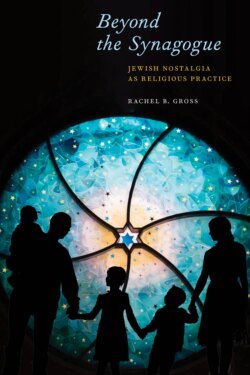Beyond the Synagogue

Реклама. ООО «ЛитРес», ИНН: 7719571260.
Оглавление
Rachel B. Gross. Beyond the Synagogue
Beyond the Synagogue. Jewish Nostalgia as Religious Practice
Contents
Figures
Introduction. Feeling Jewish
The American Jewish Mitzvah
Looking for Judaism in All the Wrong Places
Case Studies
The Breadth and Boundaries of Nostalgia
1. How Do You Solve a Problem like Nostalgia?
Redefining American Jewish Religion
Histories of Nostalgia
Popular Culture and Public History
2. Give Us Our Name. Creating Jewish Genealogy
Hobby, Commitment, or Mitzvah
The Lineage of American Jewish Genealogy
Write Your Family History Now!
A Permanent Memorial to Them
Grandpa Didn’t Tell the Truth
3. Ghosts in the Gallery. Historic Synagogues as Heritage Sites
Salvation Stories
A Synagogue by Any Other Name
You Probably Think This Museum Is about You
View from the Balcony
Our Immigrant Heritage
4. True Stories. Teaching Nostalgia to Children
We Are Neglecting Our Children
The Eternal Grandparent
This Looks Like a Palace
Some Things Change and Some Things Don’t
A True Story, Just the Way I Remember It
A Girl’s-Eye View
It’s Their Story
5. Referendum on the Jewish Deli Menu. A Culinary Revival
Movements and Revivals
An Unjustified S(ch)mear Campaign
Family Stories and Recipes
Kosher-Style and Other Standards
New York and Other Places
A Knish Going Glam
Conclusion. The Limits and Possibilities of Nostalgia
Acknowledgments
Notes. Introduction
Chapter 1. How Do You Solve a Problem like Nostalgia?
Chapter 2. Give Us Our Name
Chapter 3. Ghosts in the Gallery
Chapter 4. True Stories
Chapter 5. Referendum on the Jewish Deli Menu
Conclusion
Index
About the Author
Отрывок из книги
Rachel B. Gross
NEW YORK UNIVERSITY PRESS
.....
To examine nostalgia, we need to take seriously the feminist saying, “the personal is political.” Scholars of affect theory emphasize that emotions are political, too. Individuals’ emotions and their embodied experiences are closely connected to public life, communities, and civic bodies. Identifying American Jewish nostalgia as a “public feeling” and as a religious activity highlights the connections between how individuals make and find meaning in their own lives and how communal institutions guide the emotions that we share. Like others who study public feelings, I am not overly concerned with the distinctions between “emotion,” “feeling,” and “affect.”24 These terms are all usefully imprecise, retaining ambiguity about the origins of emotions as individual expressions or as inspired by public sentiment or corporate interest.
The institutions of nostalgia that promote and enable these feelings and practices, such as the Museum at Eldridge Street, are far from the first seemingly non-religious institutions to guide American Jews’ shared emotions toward historical events. In the second half of the twentieth century, much of American Jewish communal identity rested on commemoration of the Holocaust and support for the State of Israel. Holocaust museums and memorials increased throughout the country, and organizations that raised money for Israeli groups served as major social and political outlets for American Jews. Though the institutions of Holocaust commemoration and American Zionism were ostensibly nonsectarian, they created and upheld guiding sacred narratives for American Jews. They were so closely tied up with American Jewish identity that visiting and supporting Holocaust commemorations and Israel could be considered a religious activity on a par with attending a Passover seder. In their American contexts, both Holocaust commemoration and Zionist advocacy have conveyed stories about Jewish pasts, presents, and futures, connecting American Jews to present-day Jewish communities and stories about ancestors—precisely the work of religion.25 Recognizing Holocaust commemoration and Zionist advocacy as widespread Jewish religious activities counters Cohen and Eisen’s claims about the dissolution of Jewish communal institutions and intergenerational commitment.
.....